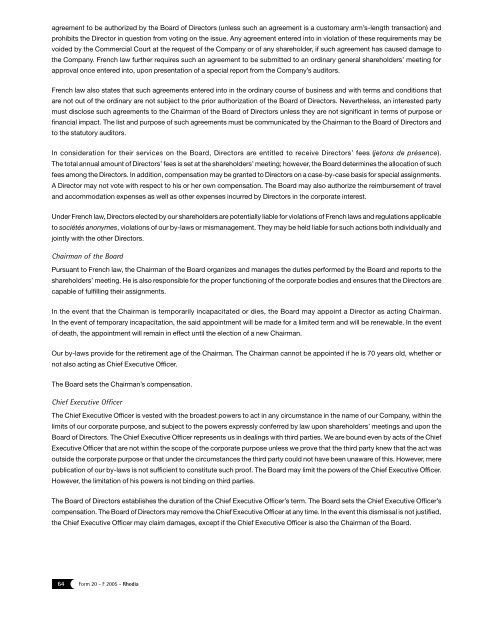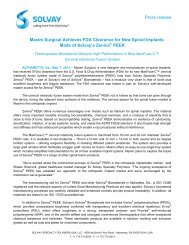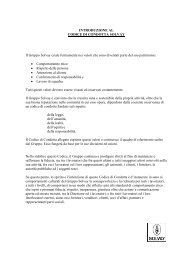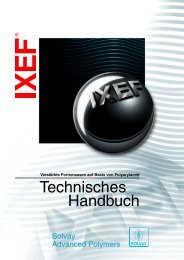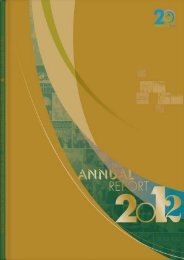Form 20-F 2005
Form 20-F 2005
Form 20-F 2005
Create successful ePaper yourself
Turn your PDF publications into a flip-book with our unique Google optimized e-Paper software.
agreement to be authorized by the Board of Directors (unless such an agreement is a customary arm’s-length transaction) and<br />
prohibits the Director in question from voting on the issue. Any agreement entered into in violation of these requirements may be<br />
voided by the Commercial Court at the request of the Company or of any shareholder, if such agreement has caused damage to<br />
the Company. French law further requires such an agreement to be submitted to an ordinary general shareholders’ meeting for<br />
approval once entered into, upon presentation of a special report from the Company’s auditors.<br />
French law also states that such agreements entered into in the ordinary course of business and with terms and conditions that<br />
are not out of the ordinary are not subject to the prior authorization of the Board of Directors. Nevertheless, an interested party<br />
must disclose such agreements to the Chairman of the Board of Directors unless they are not significant in terms of purpose or<br />
financial impact. The list and purpose of such agreements must be communicated by the Chairman to the Board of Directors and<br />
to the statutory auditors.<br />
In consideration for their services on the Board, Directors are entitled to receive Directors’ fees (jetons de présence).<br />
The total annual amount of Directors’ fees is set at the shareholders’ meeting; however, the Board determines the allocation of such<br />
fees among the Directors. In addition, compensation may be granted to Directors on a case-by-case basis for special assignments.<br />
A Director may not vote with respect to his or her own compensation. The Board may also authorize the reimbursement of travel<br />
and accommodation expenses as well as other expenses incurred by Directors in the corporate interest.<br />
Under French law, Directors elected by our shareholders are potentially liable for violations of French laws and regulations applicable<br />
to sociétés anonymes, violations of our by-laws or mismanagement. They may be held liable for such actions both individually and<br />
jointly with the other Directors.<br />
Chairman of the Board<br />
Pursuant to French law, the Chairman of the Board organizes and manages the duties performed by the Board and reports to the<br />
shareholders’ meeting. He is also responsible for the proper functioning of the corporate bodies and ensures that the Directors are<br />
capable of fulfilling their assignments.<br />
In the event that the Chairman is temporarily incapacitated or dies, the Board may appoint a Director as acting Chairman.<br />
In the event of temporary incapacitation, the said appointment will be made for a limited term and will be renewable. In the event<br />
of death, the appointment will remain in effect until the election of a new Chairman.<br />
Our by-laws provide for the retirement age of the Chairman. The Chairman cannot be appointed if he is 70 years old, whether or<br />
not also acting as Chief Executive Officer.<br />
The Board sets the Chairman’s compensation.<br />
Chief Executive Officer<br />
The Chief Executive Officer is vested with the broadest powers to act in any circumstance in the name of our Company, within the<br />
limits of our corporate purpose, and subject to the powers expressly conferred by law upon shareholders’ meetings and upon the<br />
Board of Directors. The Chief Executive Officer represents us in dealings with third parties. We are bound even by acts of the Chief<br />
Executive Officer that are not within the scope of the corporate purpose unless we prove that the third party knew that the act was<br />
outside the corporate purpose or that under the circumstances the third party could not have been unaware of this. However, mere<br />
publication of our by-laws is not sufficient to constitute such proof. The Board may limit the powers of the Chief Executive Officer.<br />
However, the limitation of his powers is not binding on third parties.<br />
The Board of Directors establishes the duration of the Chief Executive Officer’s term. The Board sets the Chief Executive Officer’s<br />
compensation. The Board of Directors may remove the Chief Executive Officer at any time. In the event this dismissal is not justified,<br />
the Chief Executive Officer may claim damages, except if the Chief Executive Officer is also the Chairman of the Board.<br />
64 <strong>Form</strong> <strong>20</strong> - F <strong>20</strong>05 - Rhodia


